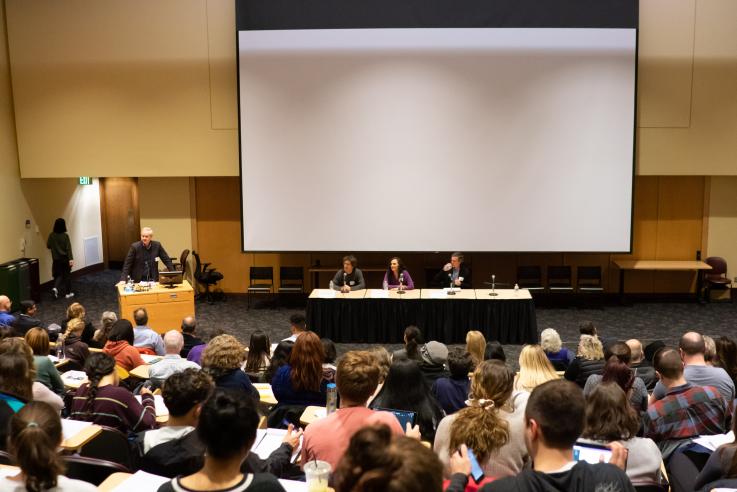The first U.S. case of the novel coronavirus (COVID-19) was diagnosed here in Washington State – bringing home, quite literally, the fact that pathogens know no borders, and highlighting the importance of local public health expertise and coordinated response.
In recognition of the need to bring experts from diverse disciplines and sectors together to shed light on this rapidly evolving epidemic, the UW MetaCenter for Pandemic Disease Preparedness and Global Health Security convened a panel discussion featuring UW experts in epidemiology, infectious disease, public health, global health, and biochemistry, as well as the doctor who treated the first coronavirus patient in the United States, Washington Health Department leaders, and The Bill & Melinda Gates Foundation director of Global Health/Vaccine Development.
“COVID-19 is moving very quickly. There has been an explosive epidemic of 75,000 confirmed cases and 2,000 deaths. We’re seeing profound social and economic impacts,“ said Judy Wasserheit, Chair, UW Department of Global Health. “The good news is that science is also moving at an unprecedented speed, global communication has been rapid and robust, and US response efforts have been strong.”
In a discussion on how COVID-19 spreads and causes disease, Peter Rabinowitz, UW MetaCenter, said “From how we raise, sell and market animals, we need to learn the lesson of how we are interacting with animals as we try to feed a growing population. COVID-19 is trying to teach us something.”
When asked what individuals can do to protect themselves against COVID-19, John Lynch, Harborview Medical Center, responded, “Wash your hands. Hand hygiene is incredibly important - do so repeatedly throughout the day.”
The panelists also explored emerging insights and innovation. “UW is the perfect place to support this sort of work, because we’re highly collaborative. When something big happens, like the coronavirus outbreak, we put our heads together,” said Deborah Fulller, UW Microbiology. Fuller said there could be a possible vaccine within months; while time is needed for a vaccine to be tested for safety, both discovery and production can be accelerated.
David Veesler, UW Biochemistry, explained that the current diagnostic test for coronavirus can only be done at the Center for Disease Control and has a five-day turnaround. “We need point-of-care tests and we need to detect the antibodies that protect against the virus,” he said.
David Baker, Institute for Protein Design, said that “All viruses are made of proteins, and we can use computers to design proteins to block the virus. Computational methods could allow us to respond more quickly to epidemics in future.”
Wasserheit concluded that “This epidemic will not be the last, it’s more of a preview. If we don’t do something differently, will see increased incidences. We need to strengthen our ability to prevent, protect and respond to new and reemerging diseases.”
The event, held at UW Seattle on February 19, attracted a full house with more than 200 people participating through audience Q&As throughout the discussion.
